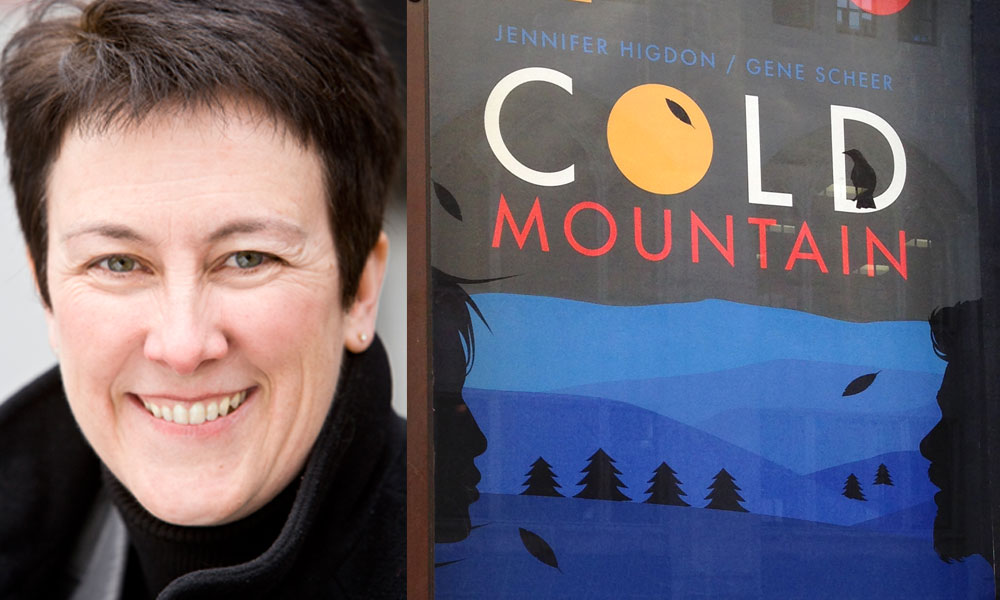ML: How is composing for opera different from the composition work you’ve done in the past?
JH: It’s really different, first of all, because you’re trying to take care of actual characters in a story. You have to think about, because opera is over two hours, how you structure something musically so that it’s interesting for the audience. You also have to think about what kind of music depicts these characters. Basically I’m trying to figure out how to draw an aural picture of these people, but it’s really hard.
The other thing is you’ve got one voice — often it’s just one voice singing — and you’ve got to balance an entire orchestra with it. So it’s not like when I wrote a percussion concerto where you’ve got drums playing, and you know drums can play loudly. It’s very easy to cover the one singer with an 80-piece orchestra. So you have to really think about how you’re going to balance everyone.
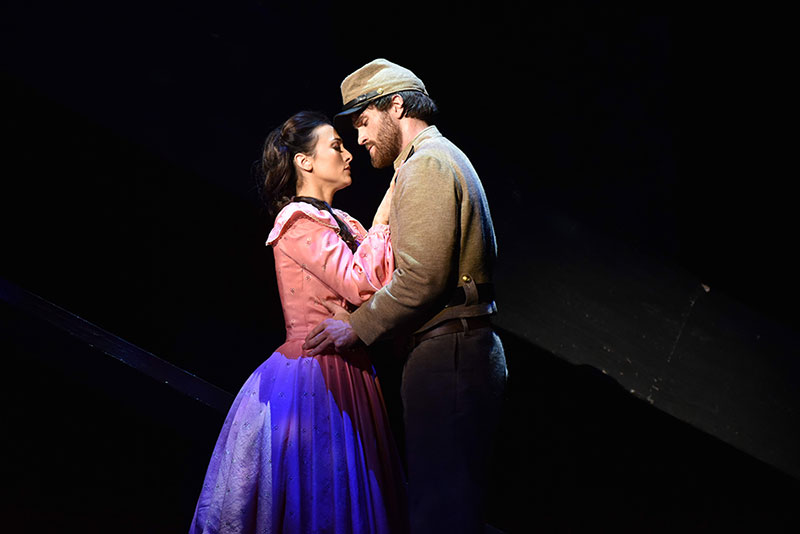
ML: What made you want to take on this particular opera as your first opera?
JH: I so identified with the area because I grew up close to Cold Mountain, and I figured there are a lot of people falling in love and a lot of people dying, and that seems like the two big themes of opera. When I was reading the book, I was like, “these people feel really familiar; I feel like I know them,” and then I realized it’s because I lived close to there. It took me a while to make that connection. There’s a little map in the front of the book and one of the times I was reading it — because I was trying to figure out why is this story resonating with me, because it’s a Civil War story, you wouldn’t think it would resonate so much — I was looking in the front of the book at this little map and I suddenly realized the farm I lived on is literally on the map. That realization was a little bit of a shocker for me, but I thought maybe this is a good fit.
ML: You can’t get much more of a perfect fit than that.
JH: Yeah, absolutely. And, you know, there was something appealing about writing some bluegrass music in an opera, too, can I just say? [laughs] I don’t think anyone’s ever done that before, but I thought it might be kind of cool to put some bluegrass in an opera.
ML: That was actually going to be my next question. How did the South’s history of folk and bluegrass music and your personal musical roots influence how you went about composing this opera?
JH: It really did a lot. And this isn’t the first time I’ve tackled bluegrass. I was commissioned years ago to write a bluegrass concerto for the Philadelphia orchestra, but there was just something about the fact that opera is considered a very elitist sort of musical language. I thought there was something very cool about being able to use bluegrass. Because I lived down in that area of the country for really formative years in my life, I had that sound in my head. And I realized one of the characters in the novel actually plays the fiddle, so it seemed so logical to just use some of the principles of bluegrass. They use open strings on the violin because there’s a drone there; there’s an emphasis on kind of a plaintive sort of melody; it’s offbeat. It’s really hard to articulate, but it’s one of those things — when you hear it, you know it’s bluegrass. Some of the songs that Charles Frazier mentioned in his novel — I didn’t use any of those songs — are folk songs that grew out of Scottish tradition and got settled in the Smoky Mountains, in the area of Cold Mountain. It felt very natural to me.
ML: What was it like working with the librettist, Gene Scheer?
JH: It was really easy. The novel is so huge, so we got together and decided which little scenes we thought would make a good opera; my rule was it has to be less than two hours and 30 minutes of music. So we tried to get the story down to what we thought were the essential elements, to follow the main characters, and then he just went off to write. He would send me chunks of the libretto and I southernized it. Gene grew up in New York and he’s Jewish, so the Southern language kind of threw him a little bit. I said, “Just write what you would write normally for a libretto and I’ll make it appropriate with the right verb tenses for each of the characters,” because it was very familiar for me. Some of the characters would use double negatives because they weren’t educated or they might be farther back in the mountains or something like that. He allowed me to adjust whatever I needed to adjust for the sake of the music, which was fantastic.
ML: I thought it was really interesting — I expected for there to be a Southern feeling to the words, but I did not expect them to be singing in a Southern accent.
JH: Isn’t that amazing?
ML: That was amazing and totally unlike anything I’ve ever heard.
JH: I’d say a lot of people expressed that. I’m not as familiar with opera and because I’ve heard a Southern accent for so long, somehow it didn’t register in my brain that for a lot of audiences it would be a very unusual experience. It’s just not what you expect when you go into an opera.
ML: The interesting thing about the libretto is that, like with all opera, it’s not lyrics so much as dialogue. What was the difference between composing with a librettist versus doing something that has a choir?
JH: In opera they call them set pieces. So there are the chorus sections, there are arias, there are duets, trios, quintets — and usually you have mostly arias and duets. They have in opera what’s known as recitative, which I can’t stand. It’s an old form in opera where someone sits there and kind of sings in a monotone. I didn’t want that, so for me it was about trying to make everything that wasn’t one of the set pieces sound musical and try to show as much in actual action on the stage as you can. Opera’s more effective when you don’t tell people what’s happening, you actually show them what’s happening, and it makes the opera experience a lot more engaging.
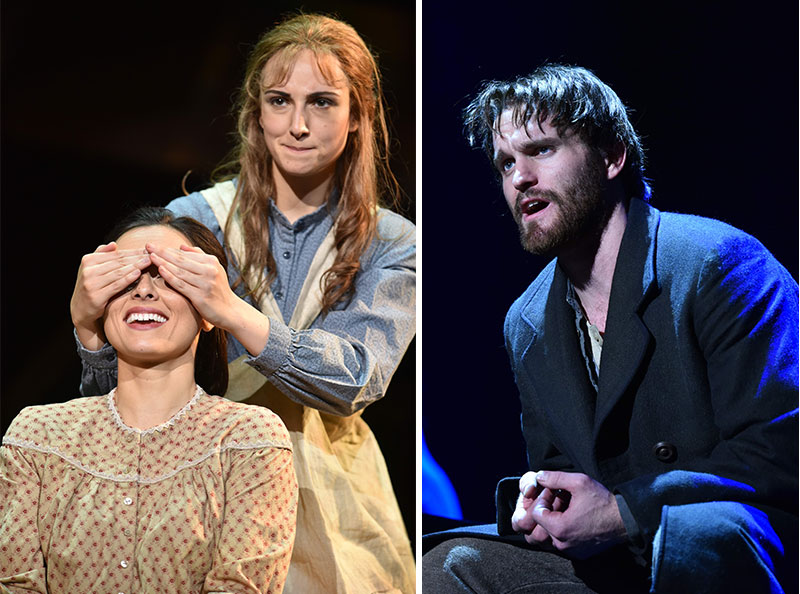
ML: Speaking of which, especially during the war scenes the music seemed really intense and emotional. I wonder if you had any specific influences in film or opera or other music that helped bring that resonance to the music.
JH: I am a big film buff, so I have no doubt that I’ve picked something up along the way, probably from just going to so many films. I often see films two or three times, so I’m sure there were things that were influencing me. I’m known for my orchestral music, which is very active anyway, so for me writing that music was not too hard, actually. It came very naturally to me.
I’m sure I was affected by things like the Star Wars films, because I saw those so many times. They came out when I was young, just as I was entering high school. I remember — I think it was the very first Star Wars film — I had an LP. It was an amazing record; it was a double set that had these great graphics. It was incredible. I have no doubt that all of the films that I’ve seen through the years have probably really affected me. Probably also the civil war films, like Glory. I had to be careful not to listen to or look at the original Cold Mountain film, because the music’s very strong in that, so when I realized I was going to do an opera based on this novel, I stopped viewing the film.
ML: That’s awesome. It’s interesting though that you say that you actively avoided the film. Why did you choose to do that?
JH: It was kind of important because the fact of the matter is the film is different than the novel. Jack White is in the film; Allison Krauss, who I love, also has some music in the film, as does Sting. There were a lot of people — big musicians — who created music for this film. The music was so strong that I was afraid that if I went near the film, I wouldn’t be able to keep the stories straight between the novel, the film, and the libretto. All three are structured differently. So I read the novel through four times and then put it down and did not go back to it until after I’d finished the opera. Same with the film. I think it was a six-year gap between the time I started and when I finally saw the film. I just re-viewed the film here in Philly because I had a film panel, actually, right before the opera started here. But I was afraid of being too influenced, because when you’re composing, you’re creating your own world; you have to stick with the libretto structure and not how the writer and director of the film, Anthony Minghella, handled the characters and how Charles Frazier handled his characters. It’s weird. You have to keep them separated in your head. So the best way to do that is just to not go near the original material.
ML: How long did you spend composing the opera?
JH: 28 months, working pretty much seven days a week. It was a very long write.
ML: That’s incredible. All of that for two and a half hours of music — that’s crazy.
JH: I know. Can you believe it? Because you write it, and then you have to put it in the orchestra. It’s a lot of notes. I think I had the computer count up all the notes in the full score, the piano-vocal score, which is the reduction so that the singers can rehearse, and also the short score, which is what I originally wrote it in — it was over 300,000 notes.
ML: What was it like seeing it performed live for the first time?
JH: It was amazing. Also, scary. [laughs] It’s been existing in my head, but suddenly to see everybody up on the stage and I thought, I’m responsible for this so if it fails, it’s on my head.
ML: There are some critics who say that Cold Mountain presents a very white-centric version of the American South during the Civil War. I’m wondering what your thoughts are on that and how operagoers should try to balance that perspective.
JH: If you read the novel, this isn’t really a Civil War novel — it’s a love story. The Civil War is a backdrop. So that’s the difference: it’s not a book about the Civil War, it’s a book about primarily three individuals — Inman, Ada, and Ruby — and their relationships and how Inman gets back to Ada and how Ruby makes Ada a better person. I guess Ada makes Ruby a better person. So the Civil War is very much a backdrop.
The opening scene of the second act isn’t even in the novel — where Lucinda the slave comes. We actually put that in. There are slaves in the novel, and they’re actually some of the most noble people in the entire story, but they really don’t make many appearances there. They’re almost nonexistent in the novel as well. If you’re looking for a novel about slavery or about the race relations at that time, Cold Mountain is not the book you’d want. When you get right down to it, it could’ve been any war. This could’ve happened in the Revolutionary War as well.
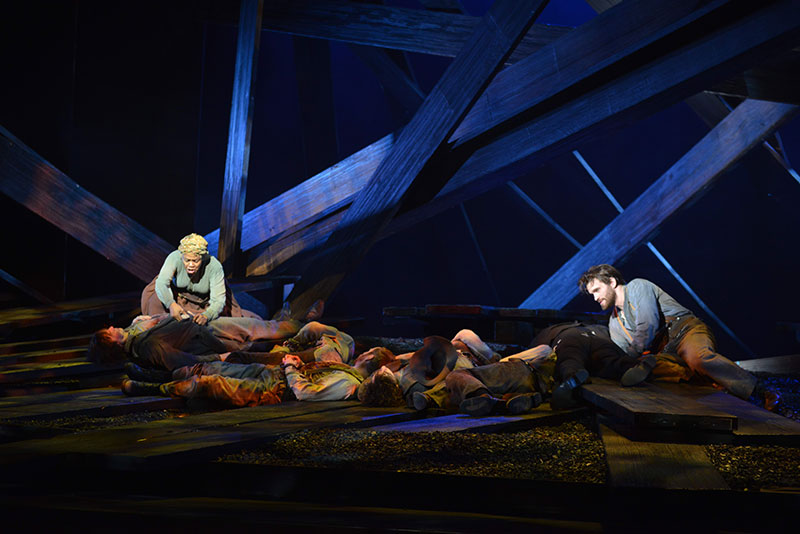
ML: This opera is part of the American Repertoire program at Opera Philadelphia, where they do a new American opera every year. How do you think that this particular program helps bring opera to a larger audience?
JH: Well, I think the biggest thing is that it’s opera that’s closer to relevant times, because a lot of the operas across the world are all really old operas, and they’re about kings and things like that, so they don’t feel as relevant to people as operas that are made now about our life in this century or even in the previous centuries. So by focusing on having some of the repertoire actually be works that are new and American, it makes it more relevant. And I could tell from audiences, there were a lot of people that this is their first opera experience. It gives audience members a certain voice. This is opera of their time.
ML: We look at opera now as a highbrow medium, but it hasn’t always been that way. It used to be the medium of the people.
JH: That’s right. So now we’re actually bringing it back to the people.
ML: When I went, I went to the dress rehearsal, and the theater was full of school aged-kids. They were watching the opera and they were cheering and applauding and booing.
JH: That was pretty amazing, wasn’t it?
ML: It was so much more interactive than any crowd I have ever seen at the Academy of Music, especially for an opera.
JH: It was fantastic. It was amazing to hear those kids’ reactions. I got such a thrill out of that, to be quite honest. I loved it. Charles Frazier loved it too. He was totally blown away by the reaction of the kids. If you write a novel, you don’t get any kind of audience reaction. People can come up and see you after they’ve read a novel and tell you, but to actually have something viscerally happening in live time, that’s a new experience.
ML: This whole experience of having his novel be turned into an opera must be quite the time for him.
JH: I think it’s overwhelming. I mean, he had tears in his eyes. After the actual performances, we would go out on stage and take a bow. I would walk back with him, and he was really emotional. It was very touching to see his reaction.
ML: How do you think, aside from bringing hordes of schoolchildren to operas, we can get more young people interested in opera?
JH: I think it’s through the contemporary operas. That’s really the best way. This is the same discussion that goes on in the symphonic world. I know that when I have concerts, a lot of times people will come in and say, “This is my first concert.” It’s amazing to see a new work. Young people are interested in the new. It’s that way for everything in their lives. They’re interested in wherever the new restaurant is, the new iPhone, the new computer the news songs, the new movies.
ML: What got you interested in opera? Have you always been interested in opera?
JH: No. I actually have been so busy in the world of the symphonic music and chamber music and choir music and band music, but what happened was that a mentor of mine that I’ve known for 30 years said to me, “I think it’s time for you to write an opera,” and I had to go off to learn about it. There are a lot of operas that I like, but there are many operas I don’t like, and I feel like I’m learning.
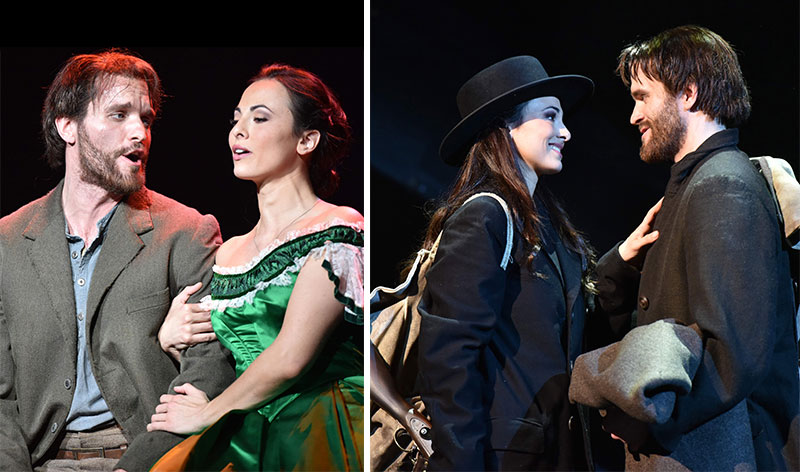
ML: How does one go about learning about opera, not just as a consumer, as a patron, but as someone who is going to compose for it?
JH: Well, basically, you start going to operas. I sought out a lot of world premieres because I wanted to see what the contemporary things were, so I traveled a lot for several years. I also just got a lot of scores and recordings and went through them. I had conversations with people who know a lot about opera, so I interviewed them, asked them what I should do, what I should not do. I went to a lot of recitals where people were singing excerpts of opera. It just was a matter of kind of immersing myself in it — trying to learn as much as I could.
ML: What’s your favorite opera?
JH: Oh, that’s a good question. I think probably Benjamin Britten’s Peter Grimes. The language is a little more contemporary and it’s a very dramatic story. I just love the way Britten handles voices. I mean, Benjamin Britten, his operas are kind of amazing. But I also thought his musical language was closer to what I write. Much more close than Puccini — I’m a real sucker for Puccini, but the musical language is very different. The orchestra’s just handled differently than the way I would handle the orchestra, and Benjamin Britten was closer to the way I would do it. He was someone I could aspire to.
ML: Cold Mountain premiered in Santa Fe last fall, as you said, and it just wrapped up here in Philadelphia. So where is it headed next?
JH: It goes to Raleigh, North Carolina in the fall of 2017, and then the Minnesota opera’s doing it in 2018 — can you believe how far out we’ve planned these things? I think there are a couple orchestras that are looking at it as well.
ML: Are you going to follow it?
JH: I probably will. If there’s not some sort of premiere that I have on another piece that’s conflicting with it. There was some conflicting premiere going on or some major orchestra work.
ML: What are you working on now that could cause such a conflict?
JH: A lot of concertos: a tuba concerto, a low brass concerto for a major orchestra, and a harp concerto. I have a piano trio. I am in the middle of finishing a chorale work — loads and loads of things.
ML: Where’s the next place we’ll be seeing you in Philadelphia?
JH: I think all my other things right now are all in other states. I had a premiere right before the opera went up here, a chamber piece, but I don’t know that I have anything scheduled here right now. Cold Mountain, the recording, is coming out on April 8, though.
ML: Do you think you’ll undertake another opera anytime soon?
JH: I think I probably will in the next couple of years. It takes a long time to write these things. You have to schedule it pretty far out in advance, but I’m thinking that yeah, I would like to write another opera. •
